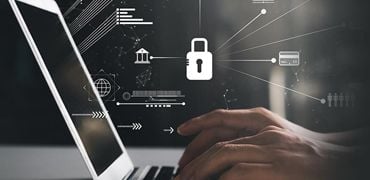Is AI Changing the Cybersecurity Industry? Yes, Here is How

- An Overview of the Cybersecurity Industry
- AI’s Role in Cybersecurity and Detecting Cyber Threats
- How Can Artificial Intelligence Testing Enhance Cybersecurity?
- Specific Applications of AI in Cybersecurity
- Challenges in How AI is Changing Cybersecurity
- Future of AI in Cybersecurity
- Is Cybersecurity a Good Career?
It can be said that Artificial Intelligence (AI) is playing the role of a double agent in cybersecurity. According to McKinsey, over the next several years, cyber attacks will be expedited using advanced tools, such as AI, machine learning, and automation. This will require organizations to evolve and leverage the same AI techniques to combat the attacks. In other words, AI is impacting the cybersecurity landscape for better and for worse. Let’s discuss exactly how AI is changing cybersecurity and what its applications and challenges are.
An Overview of the Cybersecurity Industry
The Internet of Things (IoT), cloud systems, drones, and smart devices are increasing efficiency and revolutionizing the way companies do business. However, such technological advancements have also made them vulnerable to cyber threats. According to the 2022 Gartner Board of Directors Survey, the percentage of boards considering cybersecurity a business risk has risen from 58 to 88 per cent in the past five years. Now more and more organizations are addressing cyber risk and focusing on cybersecurity. According to IBM, prolonged detection and response time to contain threats cause companies severe losses. In 2022, the average cost of data breaches was $4.35 million globally. However, the companies with a fully deployed AI and automation program saved $3.05 million due to the fast detection and response time to threats.
AI’s Role in Cybersecurity and Detecting Cyber Threats
AI is a powerful technology that offers advanced tools to combat attacks by detecting and blocking threats and securing networks and services. Unlike traditional cybersecurity techniques that only detect known threats, AI prevents new attacks using autonomous systems and learning patterns. Even when partially deployed, AI surpasses traditional systems, thus substantially minimizing threats. With attacks becoming more sophisticated, traditional methods may fail to effectively secure organizational networks and services. This is where AI steps in to extend the scope of threat detection and enhance security.
How Can Artificial Intelligence Testing Enhance Cybersecurity?
Vulnerability Management
It is important to proactively contain vulnerabilities in the network before they infiltrate the network. AI and machine learning use advanced techniques to analyze suspicious patterns and vulnerabilities, thus boosting network security.
Data Handling
AI monitors the transactional data in the organization’s network and protects it from possible threats.
Threat Detection
AI employs behavioral analysis to identify malicious activities in real-time and offers immediate responses to threats.
Network Monitoring and Security
AI sets a point of reference for the company’s network traffic and utilizes it to evaluate and guard the network.
Higher Security Over Time
AI gets smarter and improves its security measures continuously with time.
Specific Applications of AI in Cybersecurity
The applications of AI in cybersecurity include:
- Malware detection
- Breach risk prediction
- Spam filtering and bot identification
- Phishing detection
- Password protection and user authentication
Challenges in How AI is Changing Cybersecurity
Despite its advantages, AI also has some limitations. Here are the challenges in how AI is changing cybersecurity:
- AI and machine learning are expensive to implement.
- AI systems rely on various data sets that might not be feasible for small businesses.
- Attackers can also use AI to make attacks severe and difficult to detect.
- AI uses biometric authentication to protect data. However, this information can also be detrimental to the hands of an attacker.
- AI requires companies to adopt specific use cases to function accurately, which can be quite challenging.
Future of AI in Cybersecurity
According to Forbes, businesses are spending billions of dollars on AI and automation technologies, and the Industrial IoT (IIoT), where AI technologies are essential and heavily integrated, alone is set to become a $500 billion market by 2025. As companies adopt new technologies, AI continues to help organizations protect their network and systems.
Is Cybersecurity a Good Career?
Globally, there are over 3.5 million cybersecurity job openings, and this demand for cybersecurity professionals will only rise over time. The U.S. Bureau of Labor Statistics predicts job growth of 35 per cent for information security analysts in the next ten years, making it one of the fastest-growing occupations. Additionally, the average annual salary of a cybersecurity engineer in the U.S., per Payscale, is $99,246 making it an exceptional career opportunity.
Given how AI is changing cybersecurity, this field is full of challenges and opportunities. It also makes a lucrative career choice. If you are looking to upskill in this area, explore the cybersecurity courses offered by Emeritus.
By Krati Joshi
Write to us at content@emeritus.org





